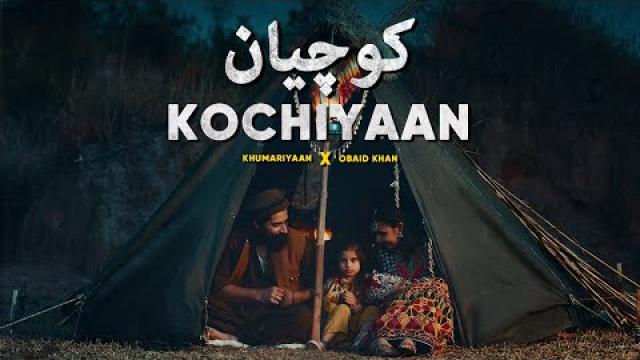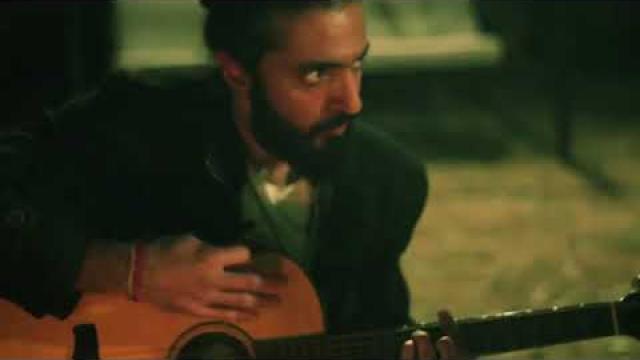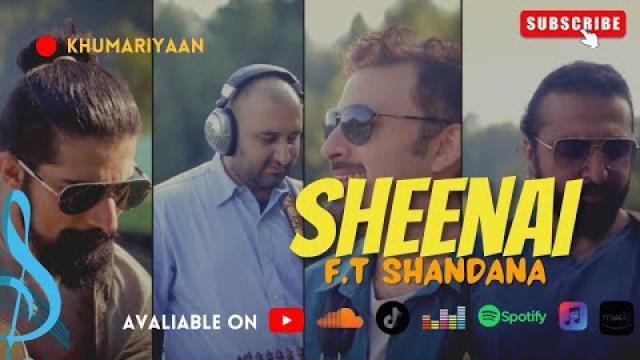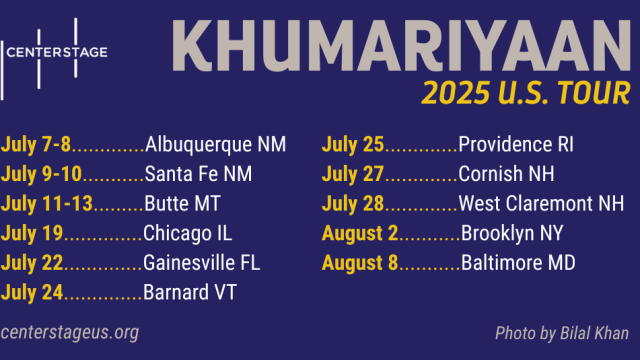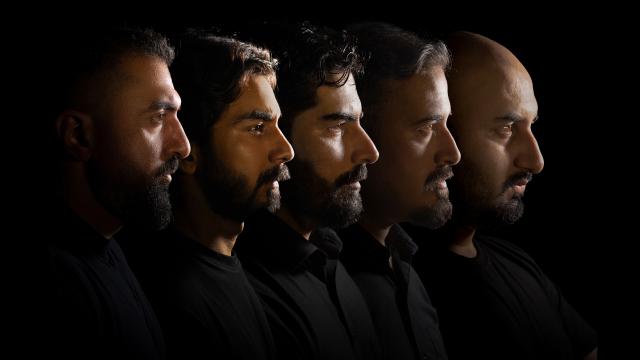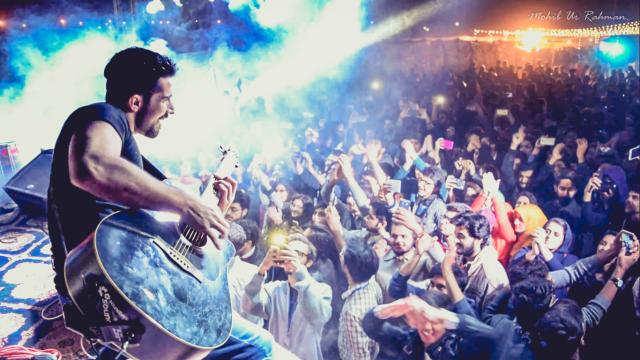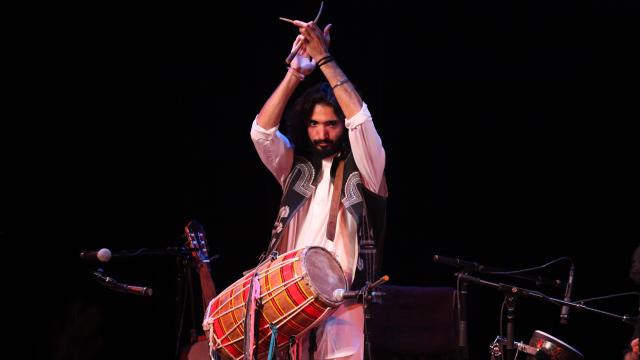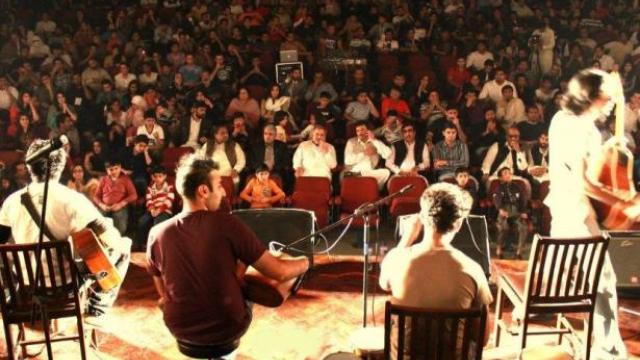
Khumariyaan

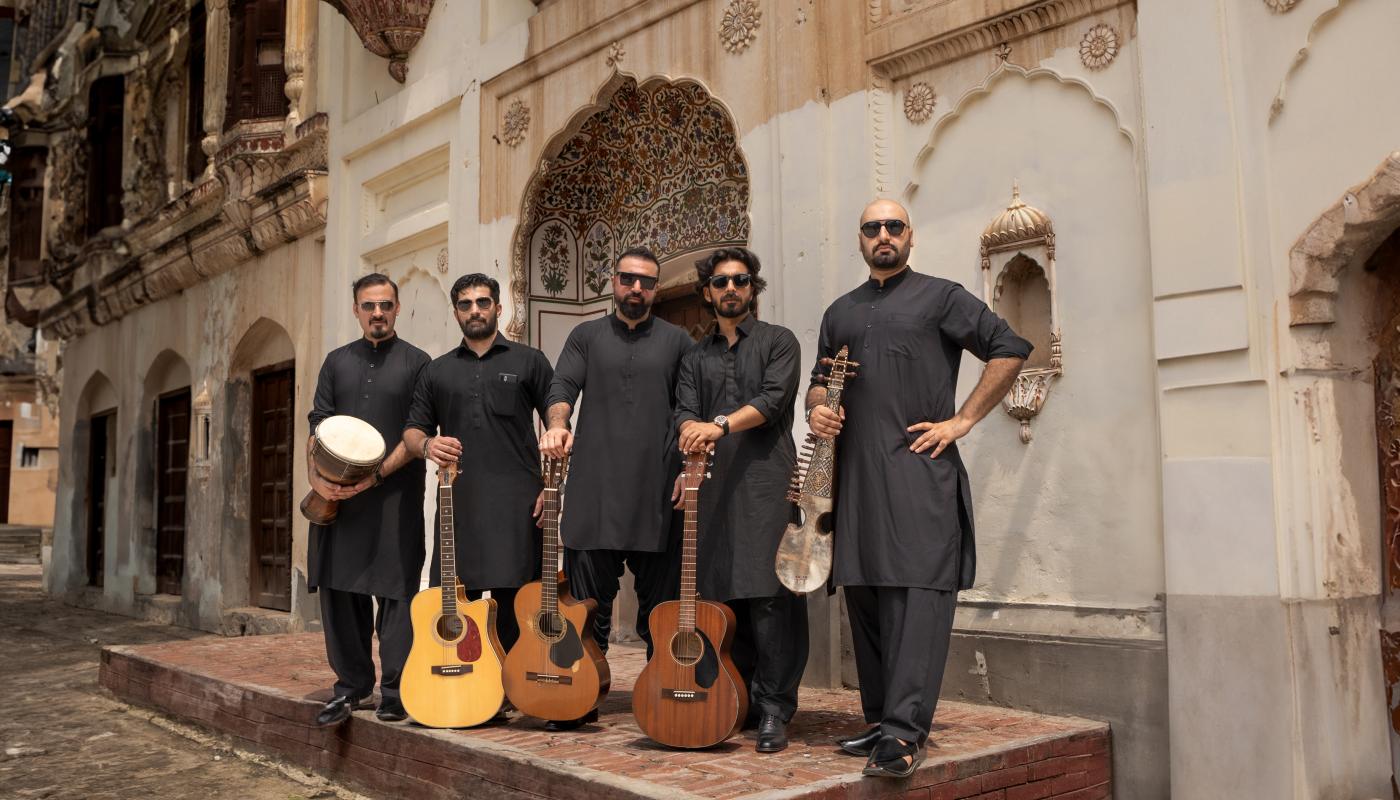
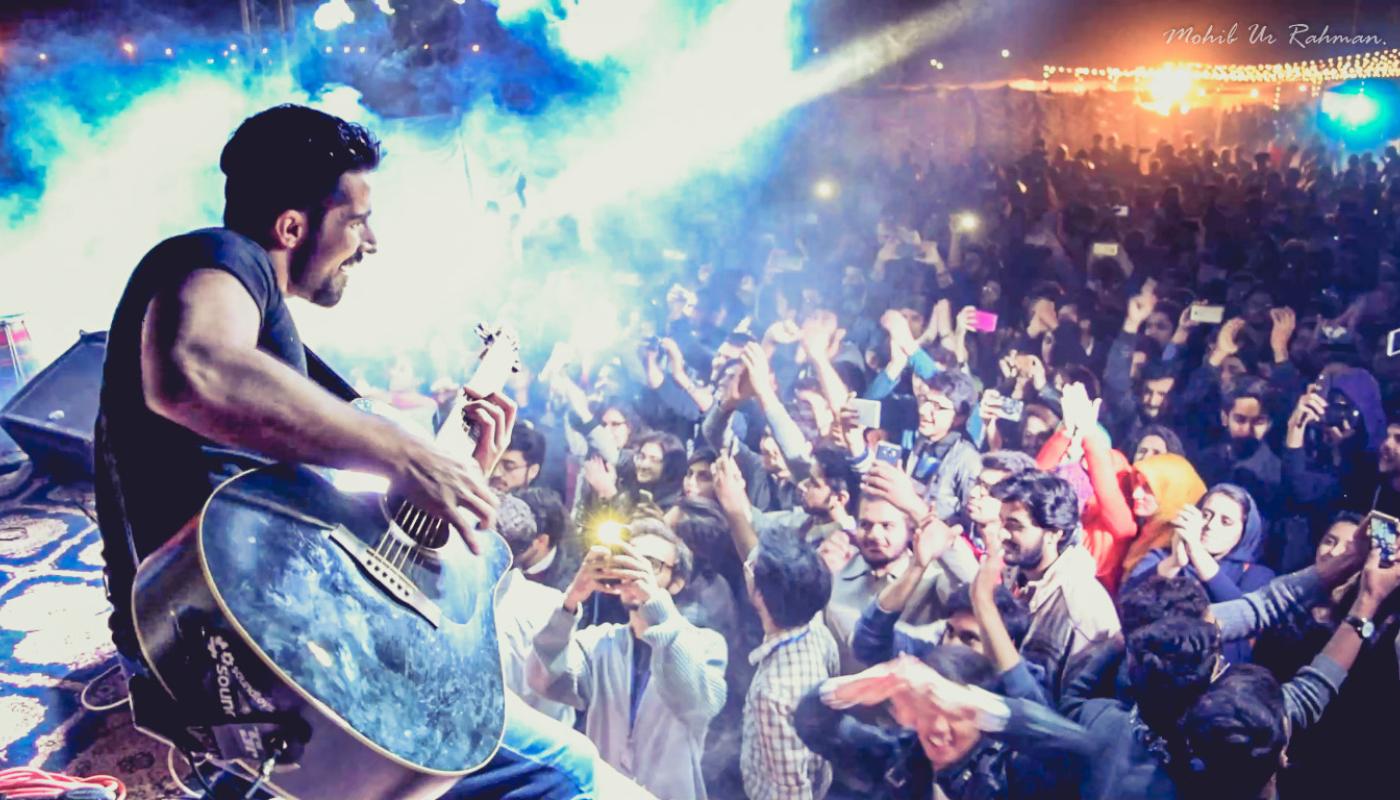
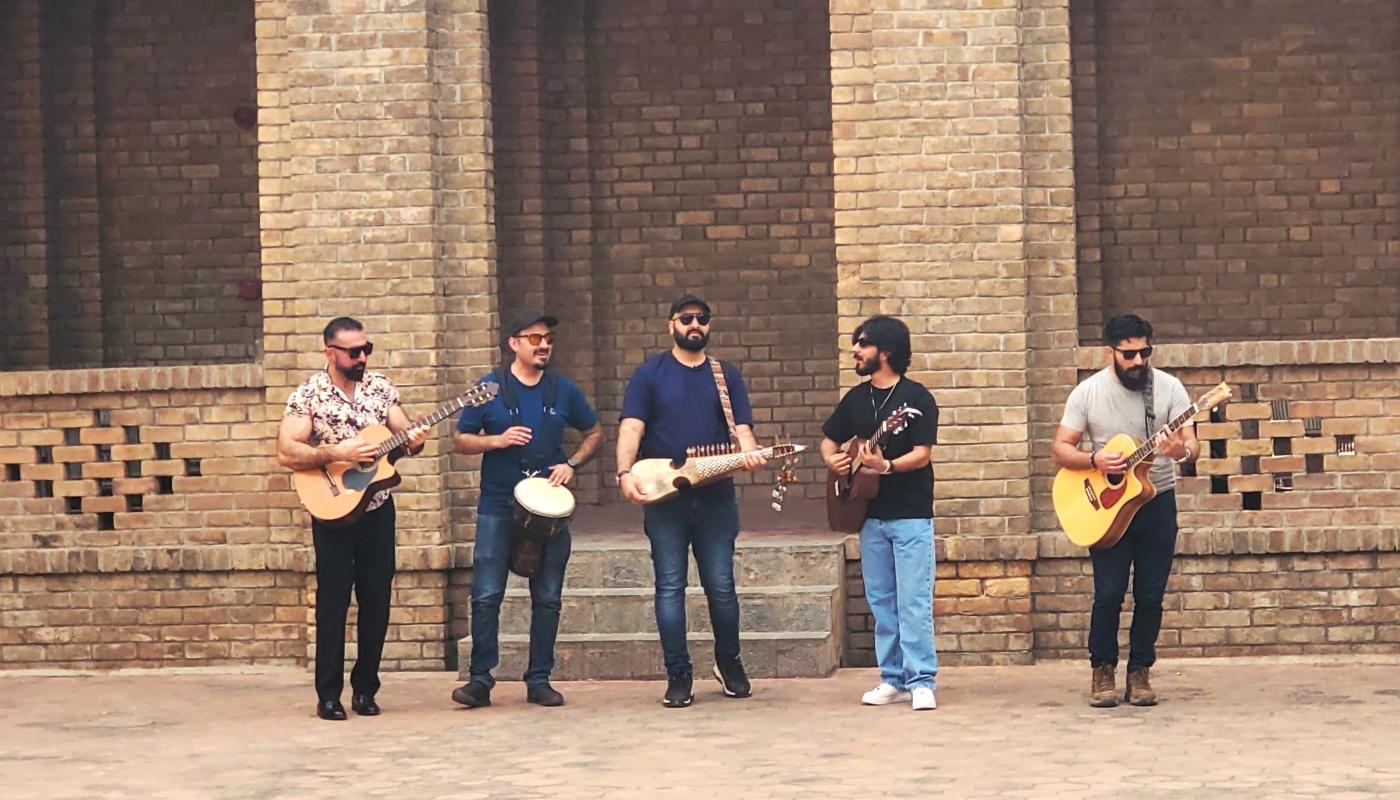
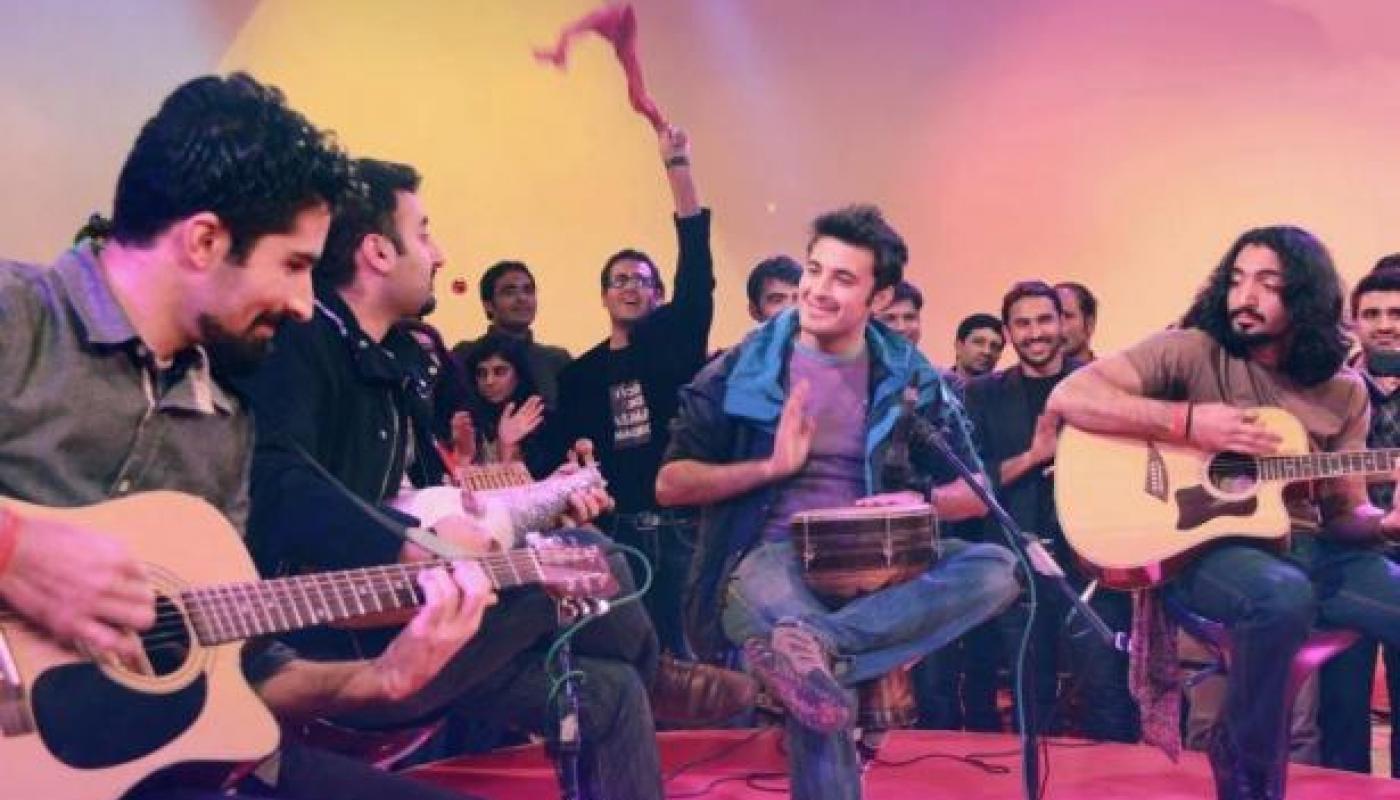
Transfixing, hyper-folk jams with rich and deep Pushtoon roots.
With its propulsive, furious sound, Khumariyaan, "The Intoxicators," has reawakened the live music scene in Peshawar, the ancient crossroads through the Khyber Pass that links Pakistan and Afghanistan. The lute-like Pashto rubab is the meeting point for this transfixing, hyper-folk quintet that intertwines the djembe-like zerbaghali (clay or wooden goblet drum), sehtar (long-necked lute), and searching vocals underpinned with driving . acoustic guitars. Khumariyaan’s rolling pulse and richly layered sound builds to frenzied intensity.
“We are group of individuals that have come together as one soul to experience and share the trance that is live acoustic music. To us, music is the best sublimated form of art. In our journey, we hope to entice musical ‘goose bumps’, and become a moving philosophical experience.” – rubab player and band leader Farhan Bogra
Khumariyaan made its international debut with the band’s 2014 Center Stage tour around the U.S. In the intervening decade they’ve shared their work in Europe, the Middle East, and in East Africa.
“Khumariyaan’s extended tunes spill across the border between Pashtoon folk and jam-band rock. It’s a cool vibe with the extra merit of puncturing stereotypes.” – Boston Globe
Videos
travelers
7 on tour:
Farhan Bogra – rabab and sehtar, band leader
Sparlay Rawail – lead guitar and dhol
Aamer Shafiq – rhythm guitar
Shiraz Khan – percussion
Obaid Khan - vocals
Sound Engineer
Center Stage Company Manager
venues
Indoors or out: clubs, amphitheaters, concert halls, and festival stages. Excellent sound system to reinforce and balance acoustic mix.
Khumariyaan’s Technical Rider (pre-contract; will be revised)
Khumariyaan’s music darted forward, nimble, vital and determined.
jon pareles, The New York Times
About Khumaryiaan
Khumariyaan is celebrated for blending traditional folk music with modern styles. The band's name, translates as "the state of musical intoxication," capturing the essence of this hyper-folk jam band.
Formed in 2009 in Peshawar, Pakistan as an instrumental quartet, Khumariyaan emerged during a tumultuous period marked by Talibanization, sectarian violence, military operations, and neo-imperialist expansions. In such a climate, art, including music, served as a form of resistance. In the intervening decade, Khumariyaan has expanded its repertory of culturally rooted music, and, in 2024, welcomed a vocalist (and third guitarist) into the mix. Hospitality is central to Pushtoon culture; Khumariyaan welcomes all under its expansive, potent, and intoxicating musical tent.
Farhan Bogra, founder, plays various ethnic lutes including the rubab and sehtar. Sparlay Rawail plays Dhol and lead guitar. He has a background in studio art and architecture from the National Council of the Arts. Shiraz Khan specializes in percussion and plays the indigenous percussion instrument Zerbaghali. Aamer Shafiq plays rhythm guitar and leads the Attan dance with the band. Obaid Khan is lead vocalist and guitarist. He holds a master's degree in Anthropology.
Photos
▸Access to downloadable high resolution photos here.
World Culture in Context
A package of virtual educational materials, tailored to students in upper elementary through high school will provide a better understanding of the context in which these artists thrive. Available Spring 2025. Visit www.worldcultureincontext.org
Follow this link to view the full version and more information about World Culture in Context.
Billing & Credit
Shortest billing for event listings, etc.
khumariyaan
on tour as part of Center Stage
The following credit is required on the title page in all printed performance programs. We appreciate its use wherever else it's practical: brochures, posters, ensemble-only promotional materials, press releases, advertisements, etc:
Khumariyaan is on tour in the USA as part of Center Stage, an initiative of the U.S. Department of State’s Bureau of Educational and Cultural Affairs with funding provided by the U.S. Government. It is administered by the New England Foundation for the Arts in cooperation with the U.S. Regional Arts Organizations. General management is provided by Lisa Booth Management, Inc. www.centerstageUS.org.
Center Stage logo placement is greatly appreciated. On web-based materials, please link from the Center Stage logo or written name to www.centerstageUS.org.
Press
The News International, The Many Rhythms of Khumariyaan
The News International, Surfin’ United States of America with hybrid-folk rock music
Albuquerque Journal, Pakistani band Khumariyaan to play ABQ, Santa Fe
2014 program notes
Khumariyaan
Peshawar, Pakistan
On tour as part of Center Stage
Farhan Bogra…….. rubab and Pushtoon sitar
Aamer Shafiq…….. rhythm guitar
Shiraz Khan………..percussion (Zerbaghali)
Sparlay Rawail…….lead guitar and Ghungro percussion
About the Band
With its propulsive and hypnotic hyper-folk sound, Khumariyaan ("The Intoxicators") has reawakened the live music scene in Peshawar, the ancient crossroads through the Khyber Pass whose contemporary culture is under attack from within and by outside factions.
Originating as a trio in 2008, and finding its final form as a quartet in 2009. Khumariyaan’s mission is to enlighten Pakistan’s youth with all encompassing aesthetics and through its music. “We are group of individuals that have come together as one soul to experience and share the trance that is live acoustic music. To us, music is the best sublimated form of art. In our journey, we hope to entice musical ‘goose bumps’, and become a moving philosophical experience.”
Pakistan’s Khyber Pakhtunkhwa province and its regional capital, Peshawar, has a very different cultural legacy than the rest of Pakistan, one with roots in both Persian and Central Asian cultures though with significant South Asian influences. Pushtoons, the dominant ethnic group in Afghanistan, are the largest minority people in Pakistan, with their own language, arts, and customs. They are often misunderstood, even in their own country. “When I went to university in Lahore,” recalls rhythm guitarist Aamer Shafiq, “everyone asked me if we wore jeans in Peshawar, or said how surprising it was that we knew English. But we are just like everyone else.”
Music, especially instrumental music, felt like the perfect means to exchange stereotypes for first-hand interaction and profound enjoyment. “We decided to introduce people to our ethnic music,” Bogra states. “To give people what we really are."
“In our country and particularly in our region, playing music, or indeed anything that is art, is a form of resistance, a resistance that many have paid for with their lives, yet the Pushtoons love their music,” says lead guitarist Sparlay Rawail. “By introducing Western and local instruments in one line up, we hope to remove the stereotypes from our culture, and bring back a love for music, and indeed, more importantly, a love for the musician. We are very lucky in regard to the support we have in our homeland from the public.”
Making their U.S. debut under the auspices of Center Stage, from September 16 to October 17 Khumariyaan tours to The Kennedy Center, to Blacksburg and Richmond, VA (with The Boston Boys), the College of St. Benedict & St. John’s University (MN), University of Dayton (OH), Wellesley College (MA), Connecticut College, Asia Society (NYC) and Portland Ovations (ME).
Who’s Who
Farhan Bogra A rubab virtuoso, Farhan is a cultural activist deeply engaged in cultural preservation. As the provincial coordinator of Institute for the Preservation of Art and Culture in Pakistan’s Khyber Pakhtunkhwa province (KPK) he represents Pushtoon music and culture all over Pakistan and across the border into Afghanistan. With the desire to show his native music to the world, and break the norms existing about art and thought in the region, he is the light from which the band draws strength.
Shiraz Khan Shiraz provides the percussive backbone to all the tunes that the band comes up with, using a native instrument that nearly faced extinction, the Zerbaghali, similar in shape to the more well known djembe. Holding a bachelor’s degree, Shiraz met with Farhan at their university and the duo got together with Aamer Shafiq to form Khumariyaan’s initial trio.
Aamer Shafiq Aamer met the Farhan and Shirz while at university, and discovered that the solo notes of the rubab were complemented by the rhythm of the guitar almost as if it were instinctual. A well known guitar player in his own right, Aamer gladly took up the role of being the fusion and western element in the band, all three of them understanding that music, if played in harmony, is sublime, no matter the instrument.
Sparlay Rawail A lecturer at the National College of Arts, Sparlay met the three band members at a concert and joined them in an impromptu jam session about a year after the trio got together. During the first half minute, it became clear to them all that the urgency, dynamics and repetitive grooves of Rawail’s lead guitar not only fit, but upped the vibrancy, resonance, gravity and energy of the band. Khumariyaan, with its propulsive, furious sound hasn’t looked back.
background
Khumariyaan: The Intoxicating Sound of a Pushtoon Musical Renaissance
It all started with a smashed lute.
A friend of the Peshawar-based ensemble Khumariyaan’s founder Farhan Bogra had brought the rubab, a traditional Pushtoon (Pashto) instrument, home, only to meet with serious paternal disapproval. The instrument was soon in pieces, to be replaced by a more respectable guitar. That got Bogra thinking: If the instrument sparked such potent passion, what might the plucky long-bodied lute be able to say? “‘Leave the rubab,’ they told him,” remembers Bogra. “‘It’s for the people who are uneducated.’ Then I realized why it was threatening.”
Bogra, like the rest of his young band mates in Khumariyaan (“The Intoxicators”), went on to teach himself a traditional instrument, in Bogra’s case the much neglected and maligned rubab, one of the mainstays of Pakistani Pushtoon music. Not content to merely learn for himself, he then went onto record a series of videos so others could learn to play. In this act of personal rebellion and with the determined hope to bring Pushtoon music and culture into the regional and international mainstream, the instrumental quartet began taking the sound of home jam sessions to the stage.
With addictive passion and trancelike instrumental pieces, Khumariyaan demonstrate why Bogra couldn’t just leave the rubab. The signature Pushtoon instrument can have the forceful twang of a banjo or a percussive, hypnotic thrum. It intertwines with the strong sonic qualities of other rare traditional instruments, including the djembe-like zerbaghali (clay or wooden goblet drum) and Pushtoon sitar (long-necked lute). Underpinning these instruments with driving acoustic guitars, Khumariyaan’s rolling pulse and richly layered sound builds to high-spirited intensity.
Americans will get a chance to experience this engaging music for the first time when Khumariyaan makes its U.S. debut as part of Center Stage.
Pushtoon music has had it rough, between local well-educated families eschewing it as too low-brow, and threats from those deeming all music and musicians suspect. During a more recent radical turn in Pakistan, many traditional and popular musicians were killed or arrested, music shops burned, and instrument makers discouraged from their craft.
But the music continues, whether at private celebrations or at friendly jam sessions fueled by MTV and later by the internet and mobile phones. At house parties or regular, small music societies, young players gather, create music on the fly, and draw on anything from Chuck Berry to WASP to Indian hits. Khumariyaan is a leader of this movement to revitalize the instrumental traditions and to bring them out of the shadows—taking risks to play live, encouraging other aspiring musicians to take up their ancestors’ instruments, and reinvigorating the live music experience for audiences throughout the region and across Pakistan.
The group sprang from a chance meeting in 2008, when Bogra spotted guitarist Aamer Shafiq carrying his instrument at a local institute and invited him to jam. They were soon joined by drummer Shiraz Khan. All are self-taught: Shafiq used to pause old music videos of his favorite metal guitarists to catch where their fingers were on the fretboard. Khan, from a tender age, would bang on anything that made a sound—tabletops, tin cans, and eventually a drum kit. About a year later, Sparlay Rawail, a student at the National College of Arts, met the three band members at a concert and joined them in an impromptu jam session. During the first half minute, it became clear to them all that the urgency, dynamics and repetitive grooves of Rawail’s lead guitar not only fit, but upped the vibrancy, resonance, gravity and energy of the band. Khumariyaan, with its propulsive, furious sound hasn’t looked back.
“No one knew much about the instruments. Some of them were almost completely lost here,” notes Bogra. “There was only one rubab maker left, and very, very few people to take lessons from.” The fate of other instruments was even bleaker. Percussionist and drummer Shiraz Khan got his first wooden zerbaghali in India, though his father told him that he had once played the hand drum after bringing a clay version home from Afghanistan in the 1960s. There were none to be found in Peshawar.
This broken link between the musical past and the challenging present reflects a larger issue: the perceptions and limited understanding of Pakistani Pushtoon culture in Pakistan as a whole. Peshawar has a very different cultural legacy than the rest of Pakistan, one with roots in both Persian and Central Asian cultures though with significant South Asian influences. This provincial capital, located on the eastern end of the Khyber Pass close to the Afghan border, has been an important crossroads for centuries.
Pushtoons, the dominant ethnic group in Afghanistan, are the largest minority people in Pakistan, with their own language, arts, and customs. Their ethnic homeland has been thrown into violence, disorder, and oppressive cultural limitations by local extremists and international conflict. Pushtoons are often misunderstood, even in their own country. “When I went to university in Lahore,” recalls Shafiq, “everyone asked me if we wore jeans in Peshawar, or said how surprising it was that we knew English. But we were just like everyone else.”
Music, especially instrumental music, felt like the perfect means to exchange stereotypes for first-hand interaction and profound enjoyment. “We decided to introduce people to our ethnic music,” Bogra states. “To give people what we really are.” Dynamic and dedicated performers, Khumariyaan musicians sink their teeth into trance-inducing pieces rich with string trills and rhythmic breaks (“Qataghani”), and moving, bittersweet rubab-driven melodies (“Sheenai”).
Without lyrics, Khumariyaan’s pieces can move audiences from many cultural backgrounds instantly. “Sometimes, it can feel much harder to get the audience connect to a piece that’s purely instrumental,” adds Shafiq. “But if you make that connection and you’re targeting multi-cultures, then instrumentals allow everyone to relate. It’s bridge building.”
“In our country and particularly in our region, playing music, or indeed anything that is art, is a form of resistance, a resistance that many have paid for with their lives, yet the Pushtoons love their music,” says Rawail. “By introducing Western and local instruments in one line up, we hope to remove the stereotypes from our culture, and bring back a love for music, and indeed, more importantly, a love for the musician. We are very lucky in regard to the support we have in our homeland from the public.”
It’s a passionate call for a new, more tolerant and expressive era of Pushtoon music and culture.
